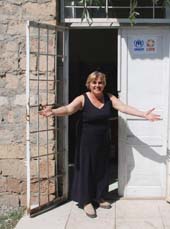Post-Conflict Recovery: Small Businesses Emerging in Shida Kartli
Friday, December 10

As a part of project Enhancing Rural Livelihoods in the Adjacent Area [ERLA], funded by the United Nations High Commissioner for Refugees (UNHCR), CARE International in the Caucasus is trying to intervene and encourage income generating activities to improve livelihoods of these conflict-affected families.
Rusiko and her husband, Malkhazi, live together with their three children and their in-laws. They have two cows and one hectare of agricultural land. At 200 GEL a month, this was their main income before the grocery shop and cafe were started.
“I heard there was a project giving grants for small start-up businesses. Initially there were rumours that a there would be only one project per village and a bakery had already been supported in my village. Fortunately, the rumours were wrong, and CARE together with UNHCR funded several business enterprises in our village,” smiles Rusiko.
With the grant (1,900 GEL), Rusiko purchased a stove and a refrigerator which allows her to cook in the cafe and keep drinks / food cold. She also bought tables and chairs from a carpentry workshop - which had also received a grant under the ERLA project. The cafe is now bringing in a net monthly income of 300 GEL for her family.
Rusiko is one of 31 people who received business start-up grants under the ERLA project. CARE went from door-to-door in 20 villages spreading the word, giving out applications, and encouraging people to come up with ideas. Over 370 people responded to this "call for ideas"; 58 were selected to attend basic business skills training and develop their proposals. Thirty-six proposals were deemed viable and these people received advanced businesses training with a final 31 people ‘graduating’ and being awarded grants to start their businesses. Soon, small bakeries, beauty salons, bee-keeping farms, poultry incubators, mini sewing and knitting shops, and blacksmiths began emerging in the different villages.
Marine Mchedlidze in the neighbouring village of Khurvaleti also received a grant. She opened a sewing shop in July 2010 and now employs three neighbours to meet the growing demand for her products. The shop currently produces bedding, clothes for women, curtains, dish clothes and other items. “We bought a sewing machine with the grant and started producing kitchen towels. First we sold them in the villages, where our products were much appreciated since our towels are much bigger and cheaper. Then the second-hand vendors started to order in bigger amounts and sell them in Gori,” she says.
Marine and her employees are now learning how to use teka [sheep wool] to produce different items and increase the profits; at the moment, her shop generates 350 GEL net per month. “I plan to open a small outlet in Gori where we would be closer to our customers and we should then start getting larger orders,” says Marine.
A total of 53,012 GEL was disbursed to fund these village business ventures and, between August and November 2010, the 31 new businesses brought in a total of between 5,000 and 8,000 GEL net every month. But the gain is not just financial, these new business men and women have also gain in knowledge, experience and new skills. Maia Baiadze, who runs a sewing shop in Ergneti village, received a second grant to further strengthen her business from “Women’s Fund”.
“Some of the beneficiaries developed good business skills which is important for the sustainability of their businesses and growth of incomes. This is what matters,” said George Badrishvili, ERLA Programme Manager.
Over the years, support to small income-generating activities has proven to be one of UNHCR's most effective tools for providing low-income households with steady revenue and reducing the risk of ‘dependency syndrome’. “UNHCR has always advocated for a Shelter Plus strategy,” says Peter Nicolaus, UNHCR Representative in Georgia, “certainly it is important to ensure that displaced people, and those affected by conflict, have a proper roof over their heads, but it is also very important to support them in being self-reliant, and this means starting small income-generating activities. We are delighted at how CARE has being putting the ‘Plus’ into this strategy.
